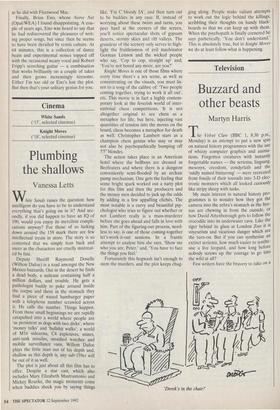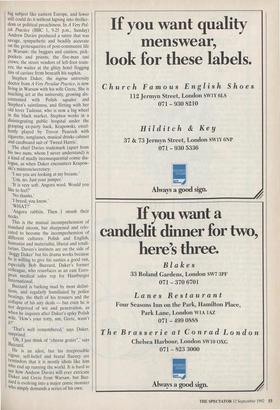Television
Buzzard and other beasts
Martyn Harris
The Velvet Claw (BBC 1, 8.30 p.m., Monday) is an attempt to put a new spin on natural history programmes with the use of whizzy computer graphics and anima- tions. Forgotten creatures with instantly forgettable names — the seriema, lingsang, mesonyx, creodont, condyrlath and the 'oddly named binturong' — were recreated from fossils of their toenails into 3-D elec- tronic monsters which all looked curiously like stripy sheep with tusks.
My main interest in natural history pro- grammes is to wonder how they got the camera into the zebra's stomach as the hye- nas are chewing in from the outside, or how David •Attenborough gets to follow the crocodile into its underwater cave. Like the tiger behind its glass at London Zoo it is voyeurism and vicarious danger which are the turn-on. But if you can synthesise an extinct seriema, how much easier to synthe- sise a live leopard, and how long before nobody screws up the courage to go into the wild at all?
Few writers have the bravery to take on a 'Derek's in the chair!'
big subject like eastern Europe, and fewer still could do it without lapsing into thriller- dom or political preachiness. In A Very Pol- ish Practice (BBC 1, 9.25 p.m., Sunday) Andrew Davies produced a satire that was savage, sympathetic and beadily accurate on the grotesqueries of post-communist life in Warsaw: the beggars and casinos; pick- pockets and priests; the five-man taxi crews; the street vendors of left-foot train- ers; the waiter at the glitzy hotel flogging tins of caviare from beneath his napkin.
Stephen Daker, the ingenu university doctor from A Very Peculiar Practice, is now living in Warsaw with his wife Grete. She is teaching art at the university, growing dis- contented with Polish squalor and Stephen's saintliness, and flirting with her old lover Tadeusz, who is now a big wheel in the black market. Stephen works in a disintegrating public hospital under the grasping ex-party hack, Krapowski, excel- lently played by Trevor Peacock with cigarette, sunglasses, musical drinks cabinet and cardboard suit of 'Tweed Harris'.
The chief Davies trademark (apart from his two nuns, whom I never understand) is a kind of madly inconsequential comic dia- logue, as when Daker encounters Krapow- ski's mistress/secretary: 'I see you are looking at my breasts.'
'Urn, no. Just your jumper.'
'It is very soft. Angora wool. Would you like to feel?'
'No thanks.'
'I breed, you know.'
'WHAT?'
'Angora rabbits. Then I smash their necks.'
This is the mutual incomprehension of standard sitcom, but sharpened and relo- cated to become the incomprehension of different cultures: Polish and English, humanist and materialist, liberal and totali- tarian. Davies's instincts are on the side of doggy Daker' but his drama works because he is willing to give his nasties a good run, especially Bob Buzzard, Daker's former colleague, who resurfaces as an east Euro- pean medical sales rep for Hamburger International.
Buzzard is barking mad by most defini- tions, and regularly humiliated by police beatings, the theft of his trousers and the collapse of his airy deals — but even he is not deprived of wit and penetration, as When he inquires after Daker's spiky Polish Nylfe. 'How's your totty, urn, Grete, wasn't 'That's well remembered,' says Daker, surprised.
'Oh, I just think of "cheese grater"; says Buzzard.
He is an idiot, but his irrepressible vigour, self-belief and brutal fluency are reminders that it is mostly idiots like him who end up running the world. It is hard to see how Andrew Davies will ever extricate baker and Grete from Warsaw, but Buz- zard is evolving into a major comic monster who simply demands a series of his own.



































































 Previous page
Previous page